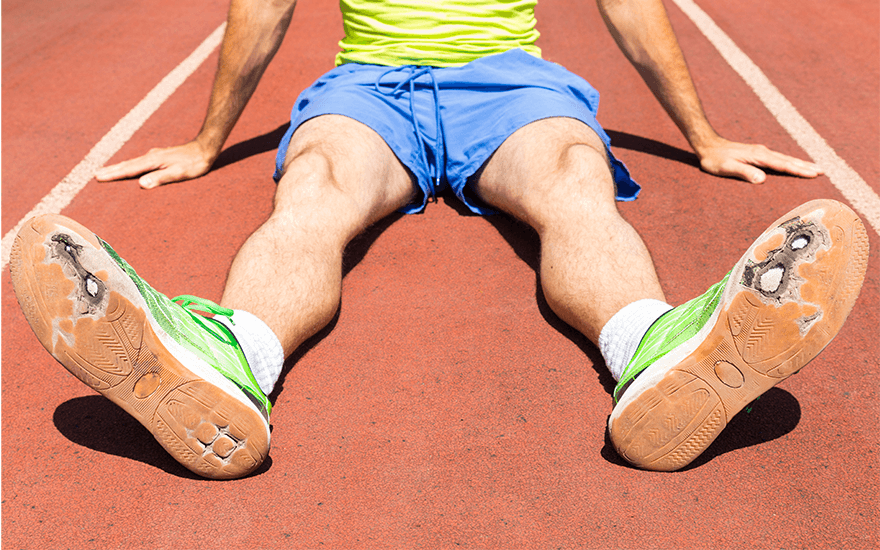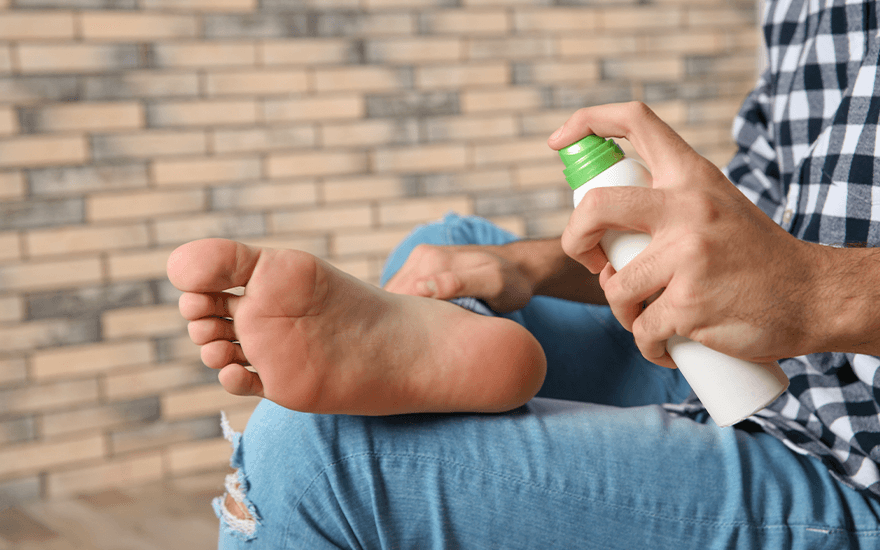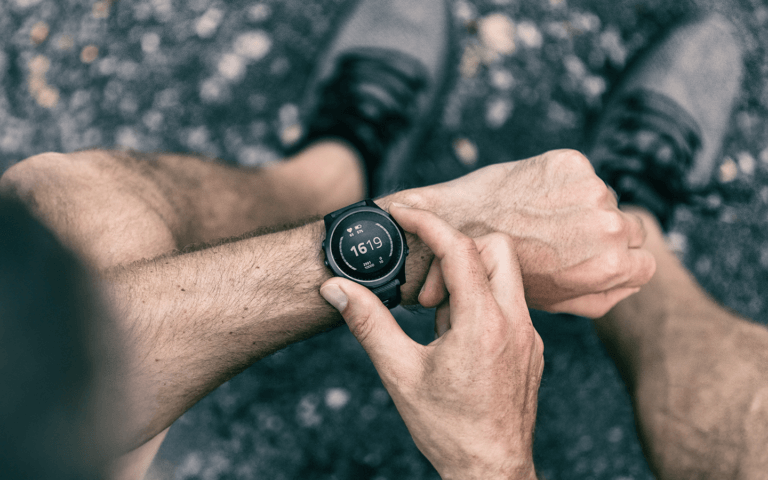There’s nothing more embarrassing! You have to take your shoes off, and before you know it, a horrible smell drifts up from your shoes and starts filling the room.
Bromodosis (or smelly feet as you might know it) is a common problem and can affect people of all ages, even if you have good hygiene.
So while it might be a bit embarrassing, don’t worry you’re not alone. Let’s figure out what’s causing those smelly trotters and how to fix it.
What’s causing your smelly feet?
First, let’s talk about the cause of your stinky feet.
The human foot has hundreds of thousands of sweat glands, and when they become active, they produce (you guessed it) sweat. This sweat consists primarily of water but contains small amounts of other substances (like proteins, oils, and bacteria).
This sweat mixes with the warmth and moisture inside your shoes, creating the perfect environment for bacteria to thrive. This bacteria living on your skin – including your feet – feeds on the sweat and oils your body produces.
As it feeds on the sweat, the bacteria produce waste that has a pungent and unpleasant odor. So it’s not your sweat that smells, but the bacteria that feed on the sweat and oil.
The intensity of this odor can depend on various factors, including the type of bacteria present, the amount of sweat produced, and the type of shoes and socks worn. Some people are susceptible to sweaty feet due to hormonal changes in the body, which typically occur in women and teenagers.
Similarly, if you have hyperhidrosis (a condition that causes excess sweating), you may occasionally experience particularly sweaty feet.
Moreover, if you are overly stressed, you can sweat unusual amounts, exercise intensely, or stand on your feet for hours.
What’s the problem with stinky feet?
Smelly feet can come with many problems, including a red face. The pungent and unpleasant odor can make it difficult to interact with others. It may cause people to avoid being close to you or engaging in activities that require proximity, such as sharing shoes or using public showers.
This can lead to feelings of shame, self-consciousness, and social isolation. But there are also a couple of other things to think about:
Health concerns
Smelly feet are usually not a serious health concern in and of themselves, but they can often indicate an underlying medical condition.
For example, your feet are constantly sweaty or have a fungal infection. In that case, you may be more prone to developing smelly feet.
Alternatively, you are experiencing persistent foot odor despite trying various remedies. If this is the case, seeing a healthcare provider to rule out any underlying health issues may be a good idea.
Personal discomfort
Besides the embarrassment and social issues that smelly feet can cause, they can also be physically uncomfortable.
The pungent odor can be unpleasant for you and those around you. In addition, the excess moisture and bacteria that can cause smelly feet can lead to skin irritation, fungal infections, and other foot problems.
Footwear damage
Smelly feet can also cause damage to your footwear. The bacteria that cause foot odor can break down the materials in your shoes, leading to premature wear and tear.

This can be especially problematic if you are wearing expensive or hard-to-replace shoes.
How can you prevent smelly feet?
We’ve told you why your feet might be smelly, but don’t worry; they are preventable.
You can tackle your smelly feet in many ways, depending on how it has been caused and your daily lifestyle choices.
Here are a few tips to try:
Wash your feet regularly
Washing your feet daily – or even multiple times if needed – can help remove excess sweat, oils, and bacteria contributing to your foot odor.
Use a soft soap and warm water to wash your feet, and scrub hard between your toes where sweat and bacteria can accumulate.
After washing, dry your feet thoroughly, including between your toes. This will prevent bacteria from building back up again.
Wear clean socks and shoes.
Unsurprisingly, if you have smelly feet, you probably have bacteria in your socks and shoes.
While socks should be cleaned regularly, the same cannot be said of shoes.
Unfortunately, you can repeatedly trigger the same unpleasant reaction if you don’t wear clean footwear. So try to alternate between shoes and wash them regularly.
Changing your socks at least once a day is a good idea. Consider wearing socks made of materials that wick moisture away from your skin, such as wool or synthetic fibers.
Use foot powder or antiperspirant.
Foot powders and antiperspirants can help absorb excess moisture and reduce the growth of bacteria on your feet. In addition, these products create a barrier on your skin that helps prevent sweat from accumulating and provides a less hospitable environment for bacteria to grow.

Apply the powder or antiperspirant to your feet before putting on your socks and shoes. Follow the manufacturer’s instructions to ensure you are using it correctly.
Alternate your shoes
Wearing the same pair of shoes day in, and day out can accumulate sweat, bacteria, and odor.
To help prevent this, consider rotating between a few different pairs of shoes to allow them time to dry out between wears. This can help reduce the number of bacteria and odor-causing substances on your feet.
Try using a shoe deodorizer.
Several shoe deodorizers available on the market can help eliminate odor-causing bacteria and freshen up your shoes.
Use insoles with antimicrobial properties or sprays and gels that can be applied to the inside of your shoes. Alternatively, you could use odor-eliminating balls that can be placed inside your shoes.
These products can help reduce the buildup of bacteria and other substances that contribute to foot odor.
Banish your smelly feet.
There are no two ways; smelly feet can be downright embarrassing. However, you shouldn’t feel ashamed because help is at hand.
There are many great ways to reduce the smell from your feet – whether by cleaning your shoes, soaking and cleaning your feet, using a powder or spray, or altering your lifestyle.
It is essential to avoid letting this problem worsen, as it could lead to confidence issues or even stop you from building relationships with new people if the problem worsens.
Ultimately, everyone suffers from a hygiene issue at one point or another, so don’t worry. As long as you follow the steps in this article, there is no reason you can’t have fresh-smelling feet in no time.
Related Articles
9 Long-Distance Running Injuries And How To Fix Them
What Happens to Your Body When You Skip Your Post-Workout Shower
Bye Bye Boring Socks- Say Hello to Hexxee…
Summer Season Sweat On: Top Tips on How to Work Out Safely in The Heat






